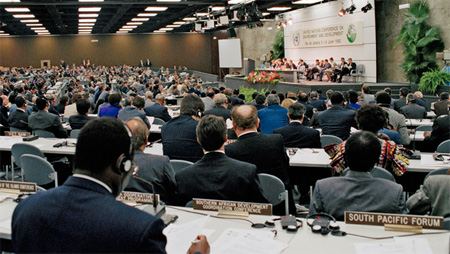
The 1992 Earth Summit was at the time among the largest international conferences
ever convened.The presence of national delegations, over 100 heads of state, and
thousands of civil society actors helped move environmental issues to a new
echelon of international policy attention.
The upcoming UN Conference on Sustainable Development, or Rio+20, will be the latest in decades of global discussions seeking to balance economic, social and environmental considerations through international policy strategies. The overarching goal of Rio+20 will be to codify environmental economics within intergovernmental statutes, which the conference will pursue through the dual themes of a "green economy" and an "institutional framework for sustainable development". Rio+20 is further organised along the seven critical issues of disasters, oceans, food, water, cities, energy and jobs; providing the conference with a formidable mandate that says much about the breadth of content and participation at Rio+20.
Sustainable development necessitates nothing short of paradigmatic shifts in the ways that political, social and economic systems are organised from local to international levels. The Rio+20 process, meanwhile, is an expansive pluralistic international dialogue in which interests from governments, civil society, private sector actors and international organisations are all brought to bear. In this respect, Rio+20 is the progeny of four decades of global environmental summitry and should be explored for evidence of the future trajectory of international environmental management.
The 1992 Earth Summit: The environment reaches high politics
The 1992 UN Conference on Environment and Development (UNCED, or 1992 Earth Summit) built upon the work of the landmark 1987 report of the World Commission on Environment and Development (Brundtland Commission) and became a watershed event for international environmental dialogue. The report, reflecting the increasing attention given to the environment since the early 1970s, had described humankind's nascent capacity to affect ecological systems in the late 20th century and advocated a realignment of global priorities around "sustainable development" concepts (World Commission on Environment and Development, 1987).
The Summit's high-level political representation, wide-ranging non-governmental participation and extensive media coverage had the cumulative effect of accelerating the movement of environmental issues into a higher echelon of international dialogue.
1992 to present: The sustainability record
Subsequent environmental summitry and current empirical realities both reveal difficulties with actuating the 1992 Earth Summit agenda. The Convention on Biodiversity (CBD) has not realised its goal of addressing the rapid extinction of plant and animal species resulting from human settlements, land-use changes, agricultural activities, pollution, poaching and other socioeconomic drivers.
Conversely, the 20 years since the 1992 Earth Summit have seen anthropogenically-driven biodiversity losses amplify significantly. These goals were revisited when the 2002 World Summit on Sustainable Development (WSSD, or 2002 Earth Summit) advocated a significant reduction in the current biodiversity loss by 2010, a goal that also failed to be realised. In addition to these tangible shortcomings, the CBD has never found a consistent global institutional character, and biodiversity issues have largely been taken up through ad hoc strategies across multiple forums.
Rio+20: Stagnation or progress for sustainable development"green economy" and concepts associated with "green growth".
This suite of policies is reflected in the encompassing scope of the green economy discussions outlined in the more recent UN draft on the goals of Rio+20. This document, known as the Zero Draft, advocates that policy options for the green economy include "regulatory, economic and fiscal instruments, investment in green infrastructure, financial incentives, subsidy reform, sustainable public procurement, information disclosure, and voluntary partnerships".
On a more thematic level, the UN Environment Programme (UNEP) has cited disillusionment with prevailing economic systems and suggested that there are movements towards a "new economic paradigm--one in which material wealth is not delivered perforce at the expense of growing environmental risks, ecological scarcities and social disparities".
Such assertions on the green economy by multiple UN bodies are reconstitutions of the decades-old sustainability discourse that took shape most formatively through the Brundtland Report. This does not mean that the concepts are necessarily stale or without value, but does suggest that the impediments to sustainable development that have been observed during past decades should be soberly recognised.
Much green growth and sustainable development logic is predicated on the possibilities of so-called win-win strategies for economic growth, environmental health and social progress. A statement by the UN Department of Economic and Social Affairs (UNDESA) exemplifies one aspect of this notion when it states that the green economy "has the potential to ensure the preservation of the earth's ecosystem along new economic growth pathways while contributing at the same time to poverty reduction".
Such pathways certainly exist. New technologies associated with the green economy, from clean power generation to pollution reduction, have shown the capacity to create jobs, improve productivity and offer new avenues for economic activities. Moreover, greater efficiency in resource usage, whether by individuals, communities, business or states, can have clear economic and environmental co-benefits.
However, the degree to which aspects of sustainability still come into conflict with systemic economic trends should not be underestimated. Competition for resources through geopolitical rivalry, economic policies focusing solely on resource availability and price, and paradoxes surrounding the curbing of consumption for environmental reasons and its encouragement for economic growth are all impediments to the green economy paradigm. These trends were present in 1992 and have amplified since.
Conclusion: The value of Rio+20
The fracture points between environmental and economic considerations are not cause for abandoning sustainable development approaches, nor do they negate the potential value of Rio+20. Judiciously developing resources is a long-term social imperative, particularly if intergenerational equity is considered. It is also an avenue from which immediate and near-term progress can be made on issues of development, quality of life and political stability
However, these benefits will require that difficult decisions be made and creative compromises found that assuage the concerns of parties with a multitude of competing interests. It is here that the deliberations of Rio+20 can have their greatest impact, even if these impacts are not readily evident from the formalised outcomes. The meetings will facilitate what Andonova and Hoffman have termed "collective wondering" about new pathways for solutions to problems spanning environmental and economic spheres.
The goalposts have shifted as a result of such connections created through diligent international dialogue, and Rio+20 will again bring together multi-sector stakeholders with a wide array of skills and ideas. The legacy of the impending discussions will be written and judged on the tangible agreements and mechanisms that are proffered at the international level, and sending effective signals from this lofty perch is no doubt necessary.
However, it is likely that effective mechanisms for managing environmental problems will come less from top-down agreements than from coordinating innovative approaches among national and subnational actors. In this sense, inclusive meetings such as Rio+20 remain invaluable.

This is an extract from the original article first published on May 2012, and reposted with permission by the Centre for Non-Traditional Security (NTS) Studies, S Rajaratnam School of International Studies (RSIS).
BY: J. Jackson Ewing